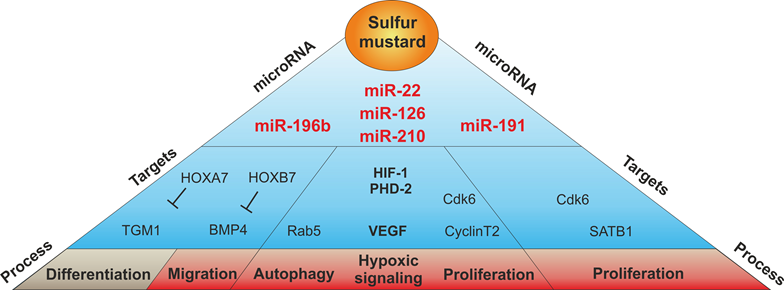Research
microRNAs and sulfur mustard-induced wound healing
microRNAs (miRNAs) represent a group of small non-coding RNA molecules which are expressed in all cell types at different quantities. Based on sequence complementarity, miRNAs specifically bind to mRNAs and thereby target more than 60% of all human genes. miRNAs are involved in the normal functioning of cells, so has dysregulation of miRNA been associated with disease.
Sulphur mustard (SM) is an extremely toxic chemical warfare agent that after exposure to the skin evokes severe inflammation, extensive blistering and delayed wound healing. We hypothesize, that SM might disturb the homeostatic balance of miRNA expression in skin cells resulting in impaired cell functions such as proliferation, migration and differentiation which are essentially required for proper wound healing. Own previous findings demonstrate that SM upregulates miR-203 in primary keratinocytes under normoxia and hypoxia, and augments hypoxia-induced levels of miR-210 in these cells. This contributes to deficiencies in cellular viability, proliferation, and differentiation of keratinocytes. These cellular defects were efficiently counteracted by the application of specific inhibitors of miR-203 and miR-210 (anti-miRs), providing evidence that miRNAs are key regulators in normal and SM-affected keratinocyte functionality.

Graphical representation of a selection of sulfur mustard-regulated miRNAs with regard to their validated or potential target mRNAs and the cellular processes that might be influenced by them.
Our next goal is to deploy next generation sequencing (NGS) in SM-treated keratinocytes. NGS technology allows to record the entirety of all RNA molecules transcribed in a cell population at a defined time point by means of RNA sequencing. This approach yields SM-specific miRNA and mRNA transcriptomes the combined analysis of which may lead to the identification of miRNA key players, cellular pathways influenced by them and molecular networks in skin cells with relevance for SM-induced wound healing deficiencies (funded by DFG RI 808/6-1 and Bundeswehr E/U2AD/ID016/IF559).
